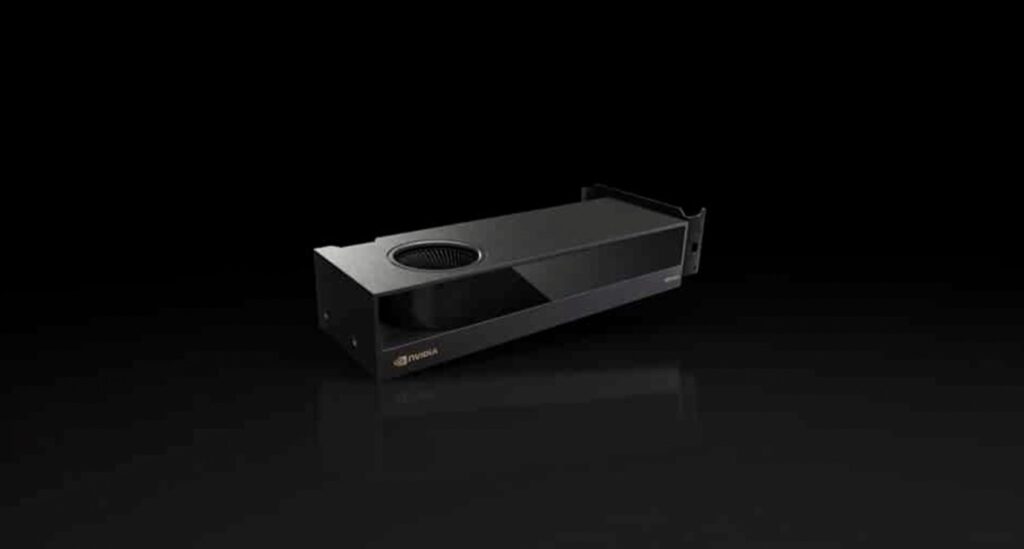Not everyone in the professional realm has a large-size workstation or deep pockets, but often they still need a GPU that can handle today’s cutting-edge, compute-intensive workflows. The Nvidia RTX 2000 small form factor GPU is geared to those using compact systems, providing the speed and efficiency necessary. In fact, Nvidia says it offers up to 1.5× higher performance than the previous-generation RTX A2000, which began shipping in November 2021. Whereas the A2000 12GB was priced at $449 at launch, the RTX 2000 retails for $625.
What do we think? Some may call the new Nvidia RTX 2000 “entry level,” but it sure doesn’t perform like it. And it expands the Ada Lovelace architecture to even more professionals.

Nvidia offers RTX 2000 SFF graphics card
Advanced computational workflows such as AI are becoming more prevalent, with a growing number of professionals seeking to harness the technology on diverse systems. For those using a compact workstation or even a full-size tower, Nvidia is offering the RTX 2000 GPU, which fits into regular-size or SFF systems.
The new GPU is based on the Ada Lovelace architecture, opening the door to advanced generative AI, complex graphics, and compute-intensive tasks for more users who need not be limited by the physical size of their system.
The RTX 2000 is both powerful and power-efficient, yet compact and able to handle a wide range of complex tasks for those working in content creation and design, CAD, architecture, data analysis, AI, and more. It offers faster performance, advanced features, and up to 16GB of GPU memory.
The GPU has a form factor of 2.7 (H) × 6.6 (L) inches, is dual-slot, and comes VR-ready.
Nvidia says the RTX 2000 achieves 1.5× the speed of the previous-generation RTX A2000 12GB (Ampere architecture) for single-precision floating-point (FP32) operations. The new GPU, with third-generation RT cores, also touts up to 1.7× the throughput of the RTX A2000, delivering faster ray-tracing performance for high-fidelity, photorealistic rendering (including DLSS), and up to 1.8× the AI performance thanks to fourth-generation Tensor cores.
| RTX 2000 | |
| GPU memory | 16GB GDDR6 |
| Memory interface | 128-bit |
| Memory bandwidth | 224 GB/s |
| ECC | Yes |
| Ada Lovelace architecture-based CUDA cores | 2,816 |
| Nvidia 4th-gen Tensor cores | 88 |
| Nvidia 3rd-gen RT cores | 22 |
| Single-precision performance | 12.0 TFLOPS |
| RT core performance | 27.7 TFLOPS |
| Tensor performance | 191.9 TFLOPS |
| System interface | PCIe 4.0 x8 |
| Power consumption | 70W (total board power) |
| Thermal solution | Active |
| Display connectors | 4× Mini DisplayPort 1.4a |
| Max simultaneous displays | 4× 4096×2160 at 120 Hz |
| 4× 5120×2880 at 60 Hz | |
| 2× 7680×4320 at 60 Hz | |
| Encode/decode engines | 1× encode, 1× decode (+AV1 encode and decode) |
| VR-ready | Yes |
| Graphics APIs | DirectX 12, Shader Model 6.6, OpenGL 4.6, Vulkan 1.3 |
| Compute APIs | CUDA 11.6, OpenCL 3.0, DirectCompute |
The RTX 2000 is available now through global distribution partners and will be offered from HP, Lenovo, and Dell starting in April. The RTX 2000 is priced at $625.